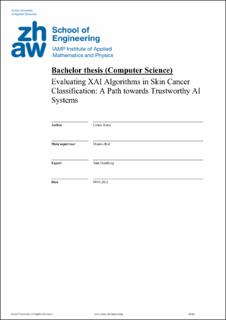Please use this identifier to cite or link to this item:
https://doi.org/10.21256/zhaw-29936Full metadata record
| DC Field | Value | Language |
|---|---|---|
| dc.contributor.advisor | Reif, Monika Ulrike | - |
| dc.contributor.advisor | Hochberg, Alan | - |
| dc.contributor.author | Homa, Celina | - |
| dc.date.accessioned | 2024-02-15T14:18:22Z | - |
| dc.date.available | 2024-02-15T14:18:22Z | - |
| dc.date.issued | 2023 | - |
| dc.identifier.uri | https://digitalcollection.zhaw.ch/handle/11475/29936 | - |
| dc.description.abstract | Artificial intelligence (AI) has become a valuable tool in skin cancer classification. However, its widespread adoption is limited by concerns about trustworthiness and its black-box nature. One promising approach to increasing trust is to improve the explainability of AI systems. This thesis explores the potential of using algorithms from the AIX360 library to achieve this goal. The algorithms - ProtoDash, DIP-VAE, LIME, SHAP and CEM - were evaluated for their runtime, simplicity, explainability/interpretability and stability in the context of skin cancer classification. The results suggest that each algorithm offers unique insights, but none can be considered universally superior. In particular, LIME and SHAP showed a promising balance between interpretability and stability, making them strong candidates. Further work is needed to identify the optimal combination of algorithms to increase confidence and to adapt these algorithms to handle complex data sets. This work is a step towards developing AI models that are not only effective, but also transparent and accountable, furthering the quest for trustworthy AI in healthcare. | de_CH |
| dc.format.extent | 78 | de_CH |
| dc.language.iso | en | de_CH |
| dc.publisher | ZHAW Zürcher Hochschule für Angewandte Wissenschaften | de_CH |
| dc.relation.ispartofseries | Bachelorarbeiten ZHAW School of Engineering | de_CH |
| dc.rights | http://creativecommons.org/licenses/by/4.0/ | de_CH |
| dc.subject | Machine learning | de_CH |
| dc.subject | Artificial intelligence | de_CH |
| dc.subject | Explainable AI | de_CH |
| dc.subject | AIX360 | de_CH |
| dc.subject | Skin cancer detection | de_CH |
| dc.subject | Image classification | de_CH |
| dc.subject.ddc | 006: Spezielle Computerverfahren | de_CH |
| dc.title | Evaluating XAI algorithms in skin cancer classification : a path towards trustworthy AI systems | de_CH |
| dc.type | Thesis: Bachelor | de_CH |
| dcterms.type | Text | de_CH |
| zhaw.departement | School of Engineering | de_CH |
| zhaw.publisher.place | Winterthur | de_CH |
| dc.identifier.doi | 10.21256/zhaw-29936 | - |
| zhaw.originated.zhaw | Yes | de_CH |
| Appears in collections: | Bachelorarbeiten ZHAW School of Engineering | |
Files in This Item:
| File | Description | Size | Format | |
|---|---|---|---|---|
| 2023_Homa_Celina_BA_SoE.pdf | 5.26 MB | Adobe PDF |  View/Open |
Show simple item record
Homa, C. (2023). Evaluating XAI algorithms in skin cancer classification : a path towards trustworthy AI systems [Bachelor’s thesis, ZHAW Zürcher Hochschule für Angewandte Wissenschaften]. https://doi.org/10.21256/zhaw-29936
Homa, C. (2023) Evaluating XAI algorithms in skin cancer classification : a path towards trustworthy AI systems. Bachelor’s thesis. ZHAW Zürcher Hochschule für Angewandte Wissenschaften. Available at: https://doi.org/10.21256/zhaw-29936.
C. Homa, “Evaluating XAI algorithms in skin cancer classification : a path towards trustworthy AI systems,” Bachelor’s thesis, ZHAW Zürcher Hochschule für Angewandte Wissenschaften, Winterthur, 2023. doi: 10.21256/zhaw-29936.
HOMA, Celina, 2023. Evaluating XAI algorithms in skin cancer classification : a path towards trustworthy AI systems. Bachelor’s thesis. Winterthur: ZHAW Zürcher Hochschule für Angewandte Wissenschaften
Homa, Celina. 2023. “Evaluating XAI Algorithms in Skin Cancer Classification : A Path towards Trustworthy AI Systems.” Bachelor’s thesis, Winterthur: ZHAW Zürcher Hochschule für Angewandte Wissenschaften. https://doi.org/10.21256/zhaw-29936.
Homa, Celina. Evaluating XAI Algorithms in Skin Cancer Classification : A Path towards Trustworthy AI Systems. ZHAW Zürcher Hochschule für Angewandte Wissenschaften, 2023, https://doi.org/10.21256/zhaw-29936.
Items in DSpace are protected by copyright, with all rights reserved, unless otherwise indicated.